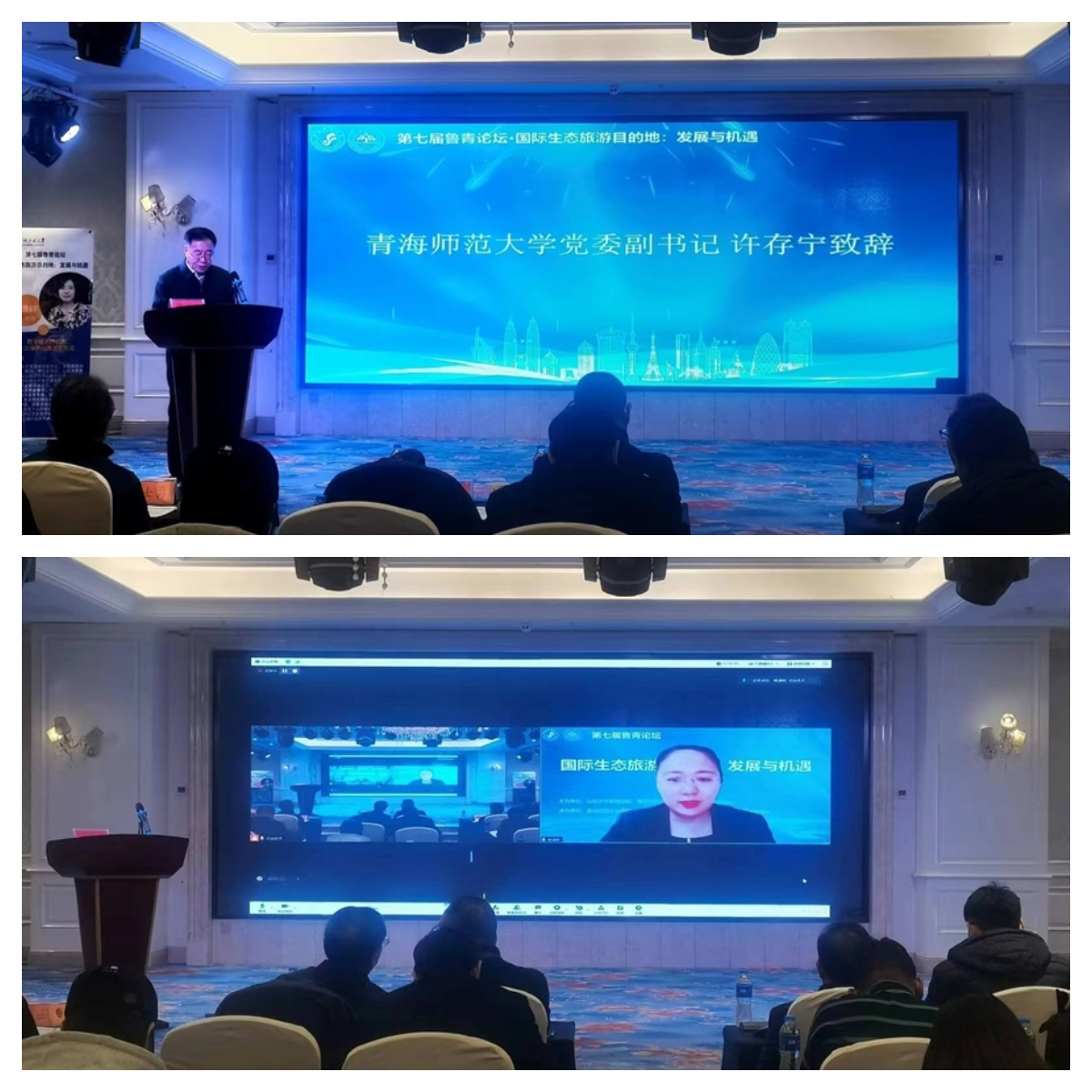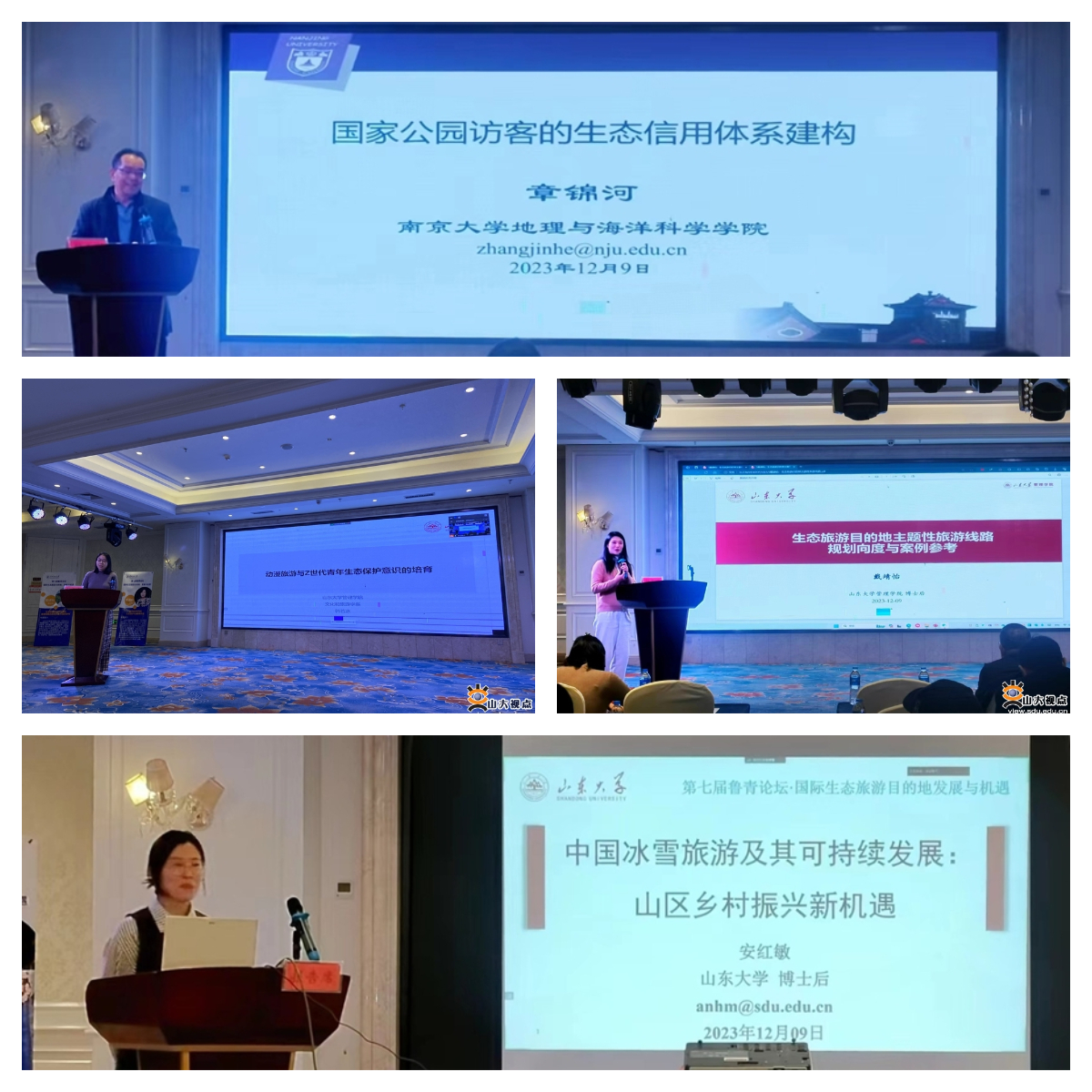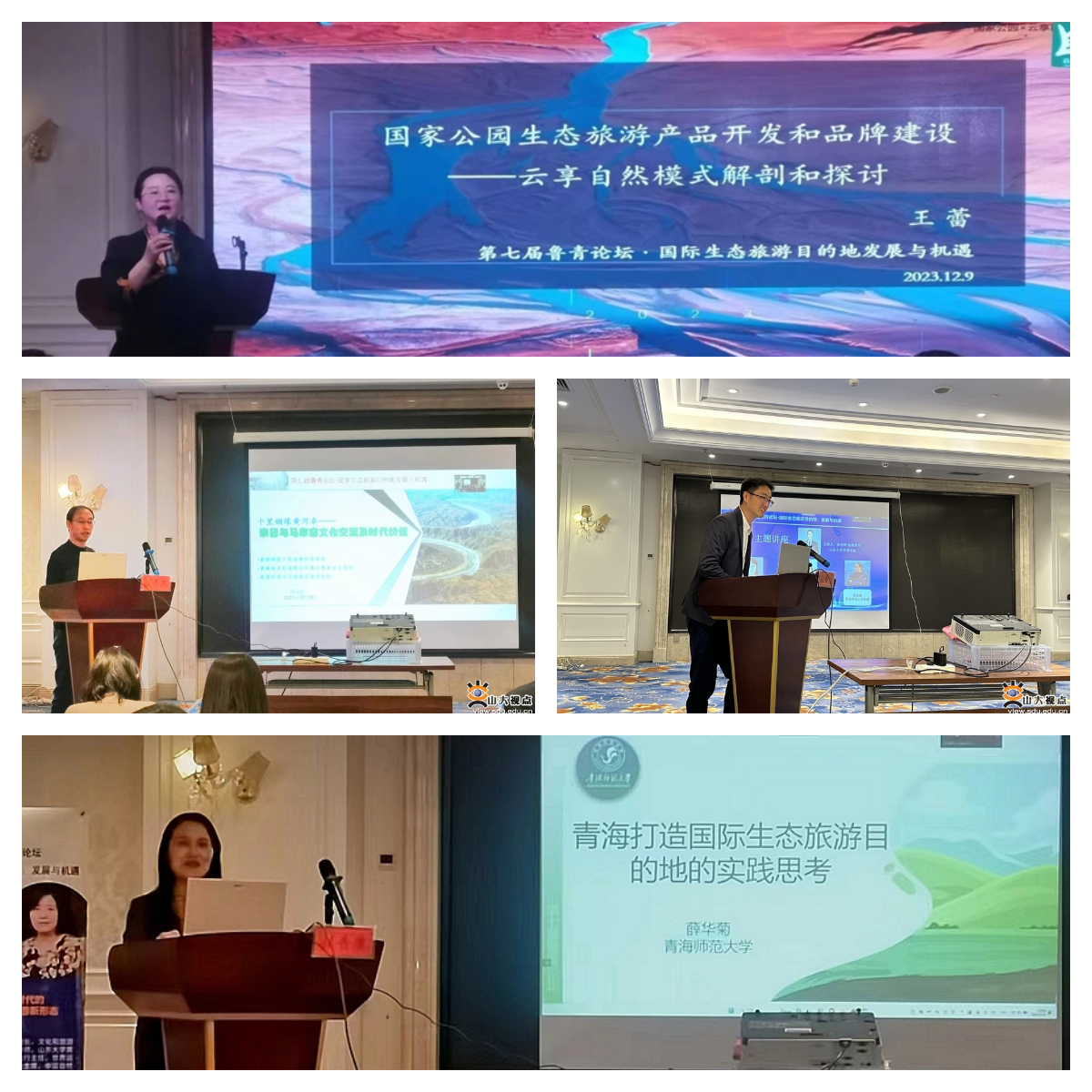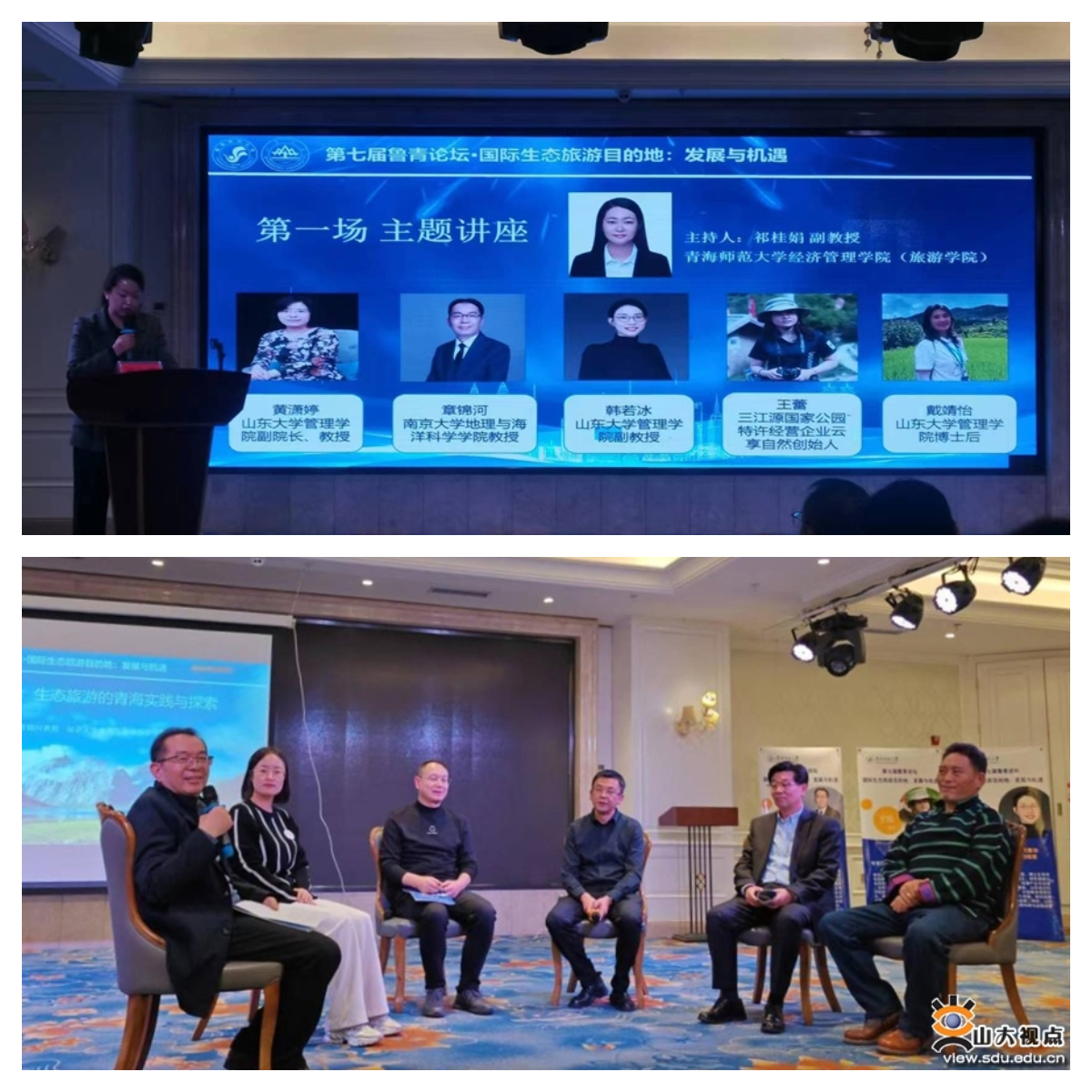To further promote the development of Qinghai Province into an international ecotourism destination and promote the achievements of the long-term counterpart support and friendly cooperation between Shandong University and Qinghai Normal University, the 7th Shandong-Qinghai Forum, hosted by the School of Management of Shandong University and the School of Economics and Management (School of Tourism) of Qinghai Normal University and organized by the Research Department and the Office of Counterpart Support of Qinghai Normal University, and the Qinghai Tourism Vocational Education Group, was held on December 9th in Xining, Qinghai Province. Xu Cunning, Deputy Secretary of the Party Committee of Qinghai Normal University, and Huang Xiaoting, Vice Dean of the School of Management, attended the opening ceremony and delivered speeches. The opening ceremony was hosted by Xue Huaju, Vice Dean of the Research Department of Qinghai Normal University.

Deputy Secretary Xu said that the two provinces have a deep friendship, and the counterpart collaboration between the two universities is a model for helping the development of Chinese western universities. Turning Qinghai Province into an international eco-tourism destination is not only the practice of Xi Jinping’s Thought on Eco-civilization but also the implementation of the “Three Maximum” Requirements. It is not only the pursuit of a unique natural landscape and cultural heritage but also focuses on the social responsibility of sustainable development. Vice Dean Huang said that the Yellow River, as the mother river of the Chinese nation, connects Qinghai and Shandong, and the ecology cooperation between the two provinces has made remarkable contributions to green development. It is hoped that the forum will further enhance exchanges between Shandong University and other institutions and better serve the economic development along the Yellow River.



Professor Huang Xiaoting of Shandong University, Professor Zhang Jinhe of Nanjing University, Associate Professor Han Ruobing and faculty representatives Dai Jingyi and An Hongmin of Shandong University, Wang Lei of Yunxiang Natural Culture and Tourism Co., Ltd, Professor Xue Huaju and Professor Hou Guangliang of Qinghai Normal University, and other scholars spoke on the digital technology innovation of eco-tourism, eco-credit system for national park visitors, eco-tourism product development and branding, the eco-protection awareness cultivation of youths, thematic eco-tourism routes, cases of international eco-tourism destinations, and Zongri culture and its value in culture and tourism development. Professor Huang believed that the rise of digital technology has brought innovative opportunities for eco-tourism. Professor Zhang proposed the necessity, feasibility and effectiveness of building an ecological credit system for national park visitors. Associate Professor Han argued that the development of animation tourism is a visible symbol of digital, cultural, industrial and social innovation in the new era, and that animation tourism can cultivate the ecological protection awareness of “Generation Z” youth. Wang Lei provided ideas for eco-tourism product development and branding in national parks by introducing the case study of the concession practice at the source of the Yellow River, Sanjiangyuan. Dai Jingyi believed that eco-tourism should play a leading role in the routes, and in the planning of thematic tourism routes in eco-tourism destinations, cultural demonstrations are of great significance in improving the quality of natural eco-tourism. Professor Xue proposed that learning from Sichuan’s world-class tourist destination construction, improving the international and ecological characteristics of tourist destination construction, and turning Qinghai Province into an international eco-tourism destination based on the construction of national parks. An Hongmin discussed the development history, main features, and challenges of China’s ice and snow tourism from a macro perspective, which provided useful reference for Qinghai to develop ice and snow tourism in recent years. Professor Hou introduced the origin of the Zongri people and Zongri culture, and proposed that Zongri culture is important for the community of the Chinese nation, the ecological protection and high-quality development along the Yellow River, Model Province of National Park in Qinghai, and the building of an international park. Qi Guijuan, Associate Professor of the School of Economics and Management (School of Tourism), Qinghai Normal University, and Sun Jinkun, Assistant Professor of the School of Management, Shandong University hosted the report session.
The dialogue session was hosted by Professor Zhang, who opened the session with “Beautiful Qinghai, Home of the Soul”, and focused on the theme of “Qinghai Practice and Exploration of Eco-tourism” from the perspective of government, business and third party, with Ma Jingang of the Qinghai Provincial Department of Culture and Tourism, Chen Dehui of the Qinghai Lake Scenic Area Protection Administration, Zhang Bo of Guoxin CITS, Donglin of Boyu Culture and Tourism Group, and You Luqing of the Qinghai Environmental Education Association, and other scholars. Zhang Bo believes that enterprises are the link between the supply and demand of eco-tourism and that eco-tourism destinations should be understood from two dimensions: first, it should be centered on ecology to consolidate the foundation of tourism development, and actively integrate it with other industries; second, the reception standards of international destinations should be in line with international standards. Starting from the protection of Qinghai Lake, Chen Dehui believes that eco-tourism is the best way for the ecosystem to feed the community and that national parks should contribute wisdom and programs for high-level protection and high-quality development. You Luqing believes that the target of environmental protection education has experienced a shift from individual to system and that measures should be taken to encourage residents to shift from passive to active protection. Dong Lin pointed out the origin of recent online public opinion in tourist destinations and the problems of income distribution and wealth gap among residents in tourist destinations and put forward relevant suggestions. Ma Jingang proposed that the practice of tourism destinations should implement new strategies with new thinking, which should start from the whole area of Qinghai Province. In the concluding remarks, Professor Zhang said: first, to explore the practice and experience of Qinghai based on the internationalization; second, to balance the relationship between protection and development; third, to consolidate the infrastructure and improve the eco-tourism service.
The forum strengthened exchanges between Shandong and Qinghai on the development of Qinghai international eco-tourism destination and provided intellectual support for promoting green development and accelerating the process that turning Qinghai Province into an international eco-tourism destination. Nearly 200 representatives from governments, universities, enterprises and associations attended the forum.